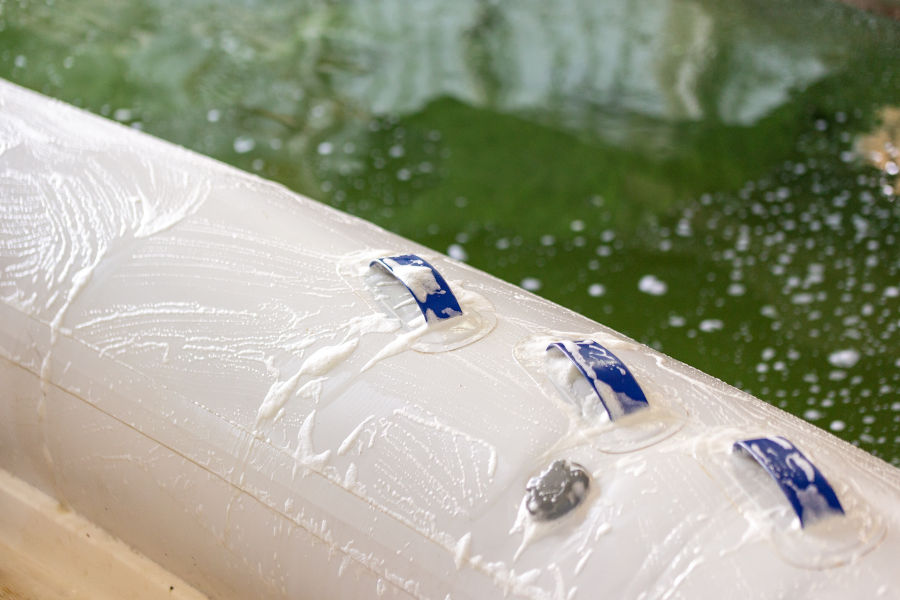
Everything you need to know about Semi-Rigids: Our Mega-FAQ!
Welcome to our comprehensive guide to buying, maintaining and day-to-day use of a RIB!
Whether you're a sailing enthusiast or a neophyte looking for essential information, you'll find answers to all your questions in this FAQ, divided into 3 chapters:
1) Find out before you buy
2) Using your RIB on a daily basis
3) Maintaining your boat
From the differences between boat types to best maintenance practices and what to do at sea, Orca Retail has put together its best guides and articles to help you make the most of your experience with your RIB.
Find out before you buy

Dinghy, semi-rigid, inflatable boat, what are the differences?
Understanding the distinctions between a tender, RIB and inflatable boat is essential to choosing the right type of boat for your needs.
The tender, inflatable and lightweight, is ideal for short trips from a larger boat. Lhe inflatable boat, fully inflatable, is easy to transport and store, but less stable for occasional use over short distances. Finally, the semi-rigid, combining a rigid hull and inflatable tubes, offers stability and performance for coastal sailing and leisure activities.
For a detailed comparison between these different options, see this article on the differences between dinghy, RIB and inflatable boat and this one on the differences between inflatable and RIB.
PVC floats, Hypalon floats, what are the differences?
PVC and Hypalon floats have distinct characteristics in terms of durability, UV resistance and cost.
To understand these differences and choose the material that best suits your needs, check out this article on Hypalon, a versatile and durable synthetic material, this one on the latest trends and innovations in RIBs, this guide to making RIB boats, and this article on choosing between PVC and Hypalon for your inflatable tubes.
What is the price of a semi-rigid boat?
The price of a RIB boat varies depending on a number of factors, including its size, make, features and condition.
Examples:
- Semi-rigid 5m, 40 HP engine: New from €9,000 - Used from €6,000
- Family semi-rigid 6m, 115 HP engine: New from €25,000 to €40,000 - Used from €18,000 to €30,000
- High-end semi-rigid 7m+, 200 HP+ engine: Over €50,000 new and €30,000 used
For advice on selecting the ideal size for your RIB boat to suit your needs and budget, check out this article on choosing the right size.
How long does a RIB last?
For its part, the rigid hull, made from composite materials for top-of-the-range models, can last 30 to 40 years.
What are the best semi-rigid models or brands?
In the world of RIBs, several brands stand out for their quality and performance. Among the top inflatable boat brands on the market are names such as Zodiac, Avon, Bombard and Highfield, renowned for their innovation, durability and reliability, offering a diverse range of models to suit different needs and budgets.
To discover the best inflatable boat brands on the market, check out this article on the best RIB brands.
What are the administrative steps? Is insurance compulsory?
Purchasing a RIB requires you to comply with certain administrative procedures, in particular registering the boat with the relevant maritime authorities.
In addition, taking out third-party liability insurance is compulsory for all motorboats, including RIBs, to guarantee cover in the event of an accident or damage to property or personal injury.
For a complete guide to the administrative procedures to follow and the insurance required for your boat, check out this complete article on administrative procedures and insurance as well as this one on purchasing a semi-rigid boat and the associated administrative procedures.
Do you need a boating licence? If so, which one?
The need to pass a boating licence to pilot a RIB depends on the power of the engine on board and the intended sailing area.
In France, for RIBs with an engine of more than 6 hp (4.5 kW), a boating licence is compulsory. A coastal licence is generally sufficient to navigate at sea up to 6 nautical miles from the coast.
To find out which boating licence is required to pilot a RIB, check out this article on boating licences for RIBs.
Where to buy a used RIB
To find out where to get the best deals and advice on refurbishing a used RIB, check out these articles on buying used inflatable boats and on refurbishing a used inflatable boat.
Using your RIB on a daily basis

How much does a semi-rigid outing cost?
The cost of a semi-rigid outing depends on various factors, such as fuel, maintenance, and possibly launching costs.
For an afternoon coastal trip in a RIB, with a 6-metre model fitted with a medium-power engine, carrying a family of 4, the estimated fuel cost (€2 per liter) would be around 100 to 150 euros in total, assuming average consumption of usual sailing conditions.
To get a better grasp of your boat trips, check out this article on preparing for a RIB trip.
What activities can you enjoy on a RIB?
Semi-rigids offer a wide range of activities, from fishing to cruising and water sports.
To find out what activities are possible on a RIB, see our article on activities to enjoy with an inflatable dinghy.
Where to sail in France on a RIB
France offers a variety of RIB sailing destinations, ranging from the Mediterranean to the Atlantic, via lakes and rivers.
For the best places to sail, check out these guides to the Mediterranean coast, the North Sea and English Channel, the Atlantic coast, marine parks, best deep-sea fishing destinations, diving spots and lake and river trips.
What accessories to use with your RIB
To personalise and optimise your RIB experience, there is a range of accessories available, from safety equipment to comfort features.
To discover customisation trends and the best accessories, check out these articles on customising semi-rigid boats and essential accessories.
How to ensure your safety
Ensuring your safety at sea is paramount.
To find out what safety equipment you need for your RIB, check out this article on safety equipment for RIB boats.
Maintaining your RIB

How to inflate your RIB? At what pressure (psi)?
To inflate your RIB, you can use a suitable electric inflator. The inflation pressure depends on the model of your boat, but in general it is between 0.2 and 0.3 bar for inflatable floors and between 0.3 and 0.4 bar for floats. For more details, check out this electric inflator buying guide, as well as this inflator guide.
How to maintain your semi-rigid? With which products?
Regular maintenance of your RIB is crucial to prolonging its life. Use suitable, high-quality cleaning products to clean surfaces, protect floats and keep components in good working order.
For advice on the best brands of inflatable boats, recommended maintenance products, seam peeling, trailer maintenance, protective tarpaulins, emergency sea puncture repair, Zodiac bladder puncture repair, and general RIB boat maintenance.
When and how to manage your boat's winter storage
To preserve your RIB during the winter, it is essential to prepare it well. This includes thorough cleaning, draining of fluids, storage in a dry place and protection from the weather. To find out more, see our detailed guide to preparing to winterise your boat.
Where to get your float repaired
If you need repairs to the floats on your RIB, you can call on specialist inflatable boat repairers. Consult this list of RIB repairers in France to find a professional near you.
Conclusion
We hope this guide has provided you with the information you need to help you navigate the world of RIBs with confidence.
Whether you're about to buy your first boat or looking for maintenance advice, remember that safety and fun are the key words in any adventure at sea.
Feel free to explore all our blog posts to expand your knowledge and get the most out of your RIB. Happy surfing!





